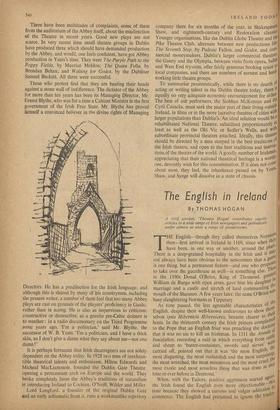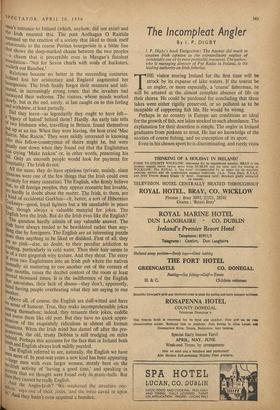The English in Ireland
By THOMAS HOGAN .1 civil servant, 'Thomas Hogan' contributes caustic articles to a wide range of Irish newspapers and periodicals under almost as wide a range of pseudonyms.
THE English—though they called themselves Norma"` then—first arrived in Ireland in 1169, since when aid have been, in one way or another, around the Pitice. There is a deep-grained hospitality in the Irish and it iii'E not always have been obvious to the newcomers that a guest is one thing, but a permanent fixture—and one who prop05's to take over the guesthouse as well--is something else. Til'id in the 1190s Donal O'Brien, King of Thomond, greetc:i, William de Burgo with open arms, gave him his daughter ' , marriage and a castle and stretch of land commanding tilLs mouth of the Shannon. A few years later, the same O'Brien w`l busy slaughtering Normans in Tipperary. As time passed, the less agreeable characteristics of tile English, despite their well-known endeavours to show thel selves ipsis Hibernicis Hiberniores, became clearer to thed hosts. In the thirteenth century the Irish princes complained to the Pope that an English friar was preaching the doctrine that it was no sin to kill an Irishman. In 1311 the Annais °lel Innisfallen, recording a :raid in which everything from Cortfc and sheep to 'butter-containers, swords and sieves' vve,c carried off, pointed out that it was 'the most English, the most disgusting, the most outlandish and the most surprising the most wretched, the most monstrous and the most cruel. t most exotic and most senseless thing that was done at that time or ever before in Desmond.' When, with the Tudors,positive aggression started again' the Irish found the English even more objectionable-111_ time because they showed a curious and vulgar addiction i'!" commerce. The English had presumed to ignore the trades man's entrance to Ireland (which, anyhow, did not exist) and the Irish resented this. The poet Aodhagan 0 Raithile summed up the reaction of a society that liked to think itself aristocratic to the coarse Puritan bourgeoisie in a bitter line that shows the deep-marked chasm between the two peoples chasm that is perceptible even in Mangan's flatulent trimslation--'Not for Saxon churls with souls of hucksters. waileth our Banshee.'
, Relations became no better in the succeeding centuries. -Ieland lost her aristocracy and England augmented her bourgeoisie. The Irish finally forgot their manners and inti- mated, in increasingly strong tones, that the invaders had outstayed their welcome. The visitors, whose minds worked Slowly, but in the end, surely, at last caught on to this feeling and withdrew, at least partially. Did they leave—as legendarily they ought to have left— a 'legacy of hatred' behind them? Hardly. An early tale tells of two Irishmen who, travelling in Britain, found themselves IlbUt Up at an inn. When they were leaving, the host cried 'Mac Mac Raicin.' They were mildly interested in knowing 'inn this fellow-countryman of theirs might be, but were was cast down when they found out that the Englishman .as crying 'Make reckon' or, in other words, presenting his hill. Only an uncouth people would look for payment for hospitality. The Irish do not. All the same, they do have opinions (private, mainly, since I)Pinions were one of the few things that the Irish could own .11,rivately for many centuries). The English. who firmly believe Lnat, to all foreign peoples, they appear eccentric but lovable, Ire hardly in doubt about the matter. The Irish, to them, are akind of occidental Gurkhas—or, better, a sort of Hibernian t, 4)ckneYs—good, loyal fighters but a bit unreliable in peace 1. ,,Itne. though always • a valuable material for jokes. The 'hash love the Irish. But do the Irish even like the English? ,rhe question hardly admits of any valuable answer. The Irish have always tended to be bewildered rather than any- th"ing else by foreigners. The English are an interesting puzzle more than anything to be liked or disliked. First of all, they are so pink—due, no doubt, to their peculiar addiction to washing, particularly in cold water. Then their hair seems to he of a rare gingerish wiry texture. And they shout. The entry even two Englishmen into an Irish pub where the natives tl°rmally sit muttering to one another out of the corners of ,eir mouths, raises the decibel content of the room at least ,everal thousand times. It is the indifference of the English i'at astonishes, their lack of shame—they don't, apparently, mind having people overhearing what they are saying to one another, „0Above all, of course, the English are dull-witted and have 'la_ sense of humour. True, they make incomprehensible jokes among themselves; indeed, they treasure their jokes, cuddle hue_n nurse them like old port. But they have no quick appre- nsi?n of the exquisitely ridiculous in almost all human ho situations. When the Irish mind has darted off after the pre- posterous, the old, trusty Dobbin is still trudging on miles i.hind. Perhaps this accounts for the fact that in Ireland both Irish and English always look mildly puzzled. seen English referred to are, naturally, the English we have s_eein most of. In post-war years a new kind has been appearing 411airge men with even larger women, sternly bent on the 4c_lrish activity of 'having a good time,' and speaking in the'ents that we thought were found only in music-halls. But An they cannot be really English. 0,.1.1(1 the Anglo-Irish? 'We weakened the structure our- Lis.; Ls: says one of their poets. 'and the wine caved in upon And they hadn't even acquired a banshee.



















































 Previous page
Previous page